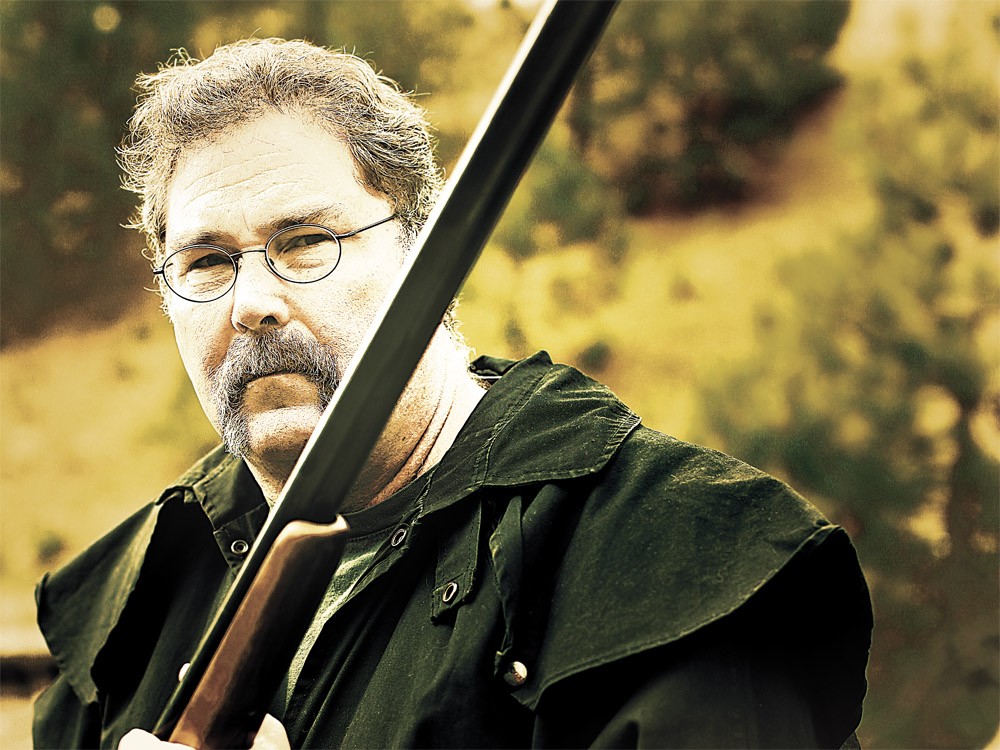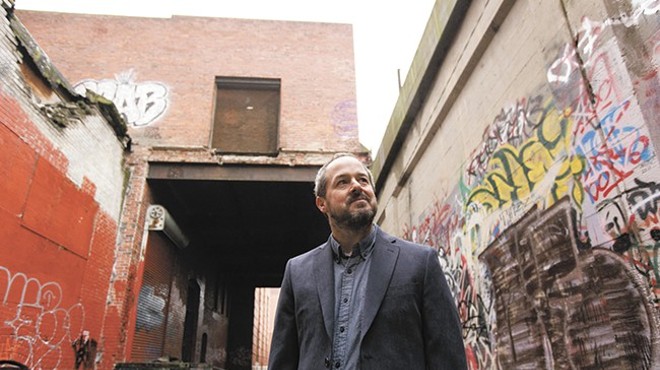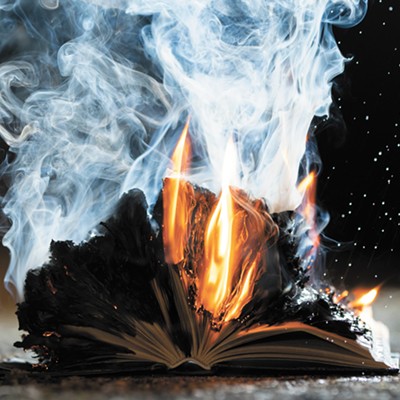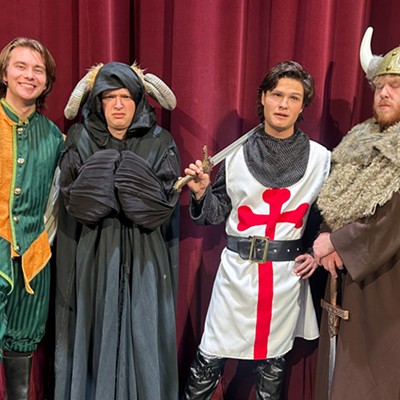Bruce Holbert’s speech is cautious and considered, like he’s unused to talking. A hint of a twang is evident in the way he pronounces, say, “for” as “fir” and “wife” as “whaf.” His thin-rimmed spectacles are at once timeless and anachronistic, and he wears a graying goatee, the arc of its mustache drawing the corners of his mouth downward into a chary frown.
Without descending into caricature, it’s not difficult to imagine this graduate of the prestigious University of Iowa Writers’ Workshop in a brown leather vest and Stetson, squinting somberly into the distance and the setting sun. There is, in other words, something about him, right down to the terse trio of syllables in his name, that evokes the American West.
That Holbert’s growing body of fiction should take on some of the outward qualities of its author isn’t unusual. What is unusual, however, is that he should devote so much of it to dissecting and even criticizing the archetype that he seems to personify at first glance.
“I’m really interested in the force the Western myth has on men’s development in particular,” he says, “because I think it destroys a lot of people.”
Back in 2002, Holbert won The Inlander’s Short Fiction Contest with a story titled “Bliss.” It touched on this theme of the destructive power of the Western myth — “Western Gothic,” is what a friend of his dubbed it — through the tale of a stag party and all the expectations and assumptions that persist with that tradition.
“Bliss” had its roots in a real-life story, and to hear Holbert talk, there’s no shortage of anecdotes from his younger days that speak to the same concerns.
“When I lived in a little farming town called St. John, I used to sit around with the old guys and they would say stuff like, ‘We used to steal a school bus every year and drive it around town.’ And they thought it was the funniest thing in the world, and I thought it was pretty funny too.
“But 15 minutes later, they would castigate kids for doing something similar. They didn’t understand that by telling that story they were encouraging the kids to do what they were doing. And so you’ve got all these young boys growing up acting like this character that’s been created for them. Then it destroys them because the character doesn’t work anymore,” he says.
That illustration sounds almost tame compared to the narrative Holbert has crafted in Lonesome Animals, his first published novel, which will be released this month. The story follows a series of gruesome murders in and around Okanogan County in the post-Depression era. In true Western style, tinged with the noir stylings that are more familiar to the urban landscape, a maverick lawman sets out to find the killer and bring him to justice.
But just as Holbert maintains that the Western myth is flawed because it lacks a “moral center,” so too does the notion of justice that it embraces. An eye for an eye may be simple and even blissfully cathartic in practice, but it avoids essential nuance. In Lonesome Animals, the author likens this kind of justice to “a poor shot occasionally firing a round into a fistfight.”
There’s a larger problem inherent in this idea of justice: The person charged with meting out the retribution crosses a moral line in its name.
The enforcer — and beneficiary — of this system that Holbert has created is Russell Strawl. He embodies the failings of the Western myth at a time when the West in which the myth is rooted was already fading into history. The novel’s horses are being replaced by automobiles. Rivers are being plugged by massive concrete dams.
As his world lapses, Strawl continues to track outlaws because it’s his sole talent, because he is bored, because he is broke. Otherwise he’s simply a “mean dog with nothing to guard.” And in his pursuit of the serial killer that has murdered in cold blood and flayed and gutted the corpses, Strawl impetuously destroys and maims the innocent for the sake of expedience. Chaos for the sake of order.
“I write a lot about disorder,” says Holbert. “I don’t know if I believe there is much order. I mean, trying to get some together is necessary and good, but I feel a little bit about order like I feel about stories. Sometimes the effort for order can destroy what it’s trying to build.”
Like “Bliss,” there are strains of autobiography in Lonesome Animals. Strawl owes a loose debt to Holbert’s great grandfather, surnamed Strahl, who shot Holbert’s grandfather dead in a hazy dispute over land.
Autobiography also feeds into Strawl’s character in the way a past misdeed looms over his life — a trait that might be considered the hallmark of the contemporary Western.
This soul-deep stain was initially meant to parallel chapters in the novel that were ultimately cut and published separately in the New Orleans Review. Those pages recounted damage the Western myth has wrought on Holbert’s own life, when, in an episode of recklessness at the age of 22, he accidentally shot his best friend to death at the Omak stampede.
“It’s the most horrible thing that I’ve ever been involved in,” Holbert says, his voice low and quavering. “Having children now, I know — or at least I can fathom — how much that took from [his parents]. And for them to say, ‘All we want you to do is promise you’ll write us every Christmas and tell us how you’re doing...’ — it’s strange to have your lowest point be also the point where you see humanity at its best.”
Perhaps as a way of serving out his own form of penance, Holbert returns again and again to fictional narratives that challenge the larger and more insidious Western narrative that worked for “maybe a 20-year period. But people have been living off that myth for a hundred years since.”
“I worry about the power of story,” he says, “because it can mess people up.”
Bruce Holbert • Thu, May 24 at 7 pm • Auntie’s Bookstore • 402 W. Main Ave. (838-0206)


























